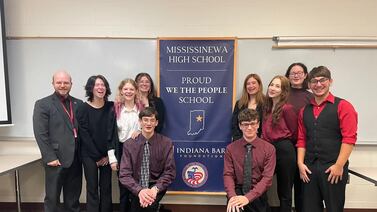Sign up for Chalkbeat Tennessee’s free daily newsletter to keep up with Memphis-Shelby County Schools and statewide education policy.
At last, the Memphis-Shelby County Schools superintendent search has an end date in sight.
Board members are set to select a new public schools leader from a slate of three out-of-town finalists in a meeting on Feb. 9, signaling a resolution to a process that is well into its second year.
Finalists Yolonda Brown of Atlanta Public Schools, Marie Feagins of Detroit Public Schools Community District, and Cheryl Proctor of Portland Public Schools in Oregon made their final cases to board members in public interviews on Friday, the culmination of a days-long return visit to Memphis that also included private interviews with community leaders and educators, as well as a tour of school buildings.
Choosing one of the three candidates will be a final step for the Memphis school board, and could be a testament to the work board members did to relaunch a second, smoother search process for a successor to former Superintendent Joris Ray.
A successful appointment requires votes from six of the school board’s nine members, and Joyce Dorse-Coleman, vice chair of the board and co-chair of the search committee, said Friday she had the “utmost confidence” in the board agreeing on a candidate.
“It’s been a journey, and we’re ready to move on,” Dorse-Coleman said, adding that she has appreciated the “strong leadership” of Toni Williams, the district’s former finance chief who has held the interim role since August 2022 following Ray’s exit.
Successful contract negotiations with the board’s selection will bring an outside leader to helm Memphis public schools for the first time in more than a decade. The new superintendent is expected to start by July 1.
Two of the three finalists in Memphis’ restarted search also applied to the role back in the spring. Feagins was among a public list of applicants during the initial search. Proctor revealed during her interview Friday that she was also a contender in the spring, but withdrew before finalists were announced because of a family emergency. Brown appears to be a new applicant.
Board members tailored questions during the second-round interviews to each of the three finalists’ experiences, but themes emerged that reflect the district’s needs and community’s concerns. Chalkbeat selected a highlight of each candidate’s two-hour interview process for publication.
Yolonda Brown, chief academic officer in Atlanta Public Schools
Brown told board members she would consider conducting an academic audit for Memphis-Shelby County Schools, similar to one by the Council of Great City Schools she used to implement changes in Atlanta.
“We were able to streamline the support, and schools knew exactly who they could call, reach out to, and get support from ... and they knew what services we could provide. And so that was the biggest impact,” Brown said.
Speaking about how she would lead as a newcomer to Memphis, Brown said: “It doesn’t matter how great you know academics or the strategy. If the culture is not right, it doesn’t matter ... And so you don’t come in and automatically say, ‘Everything’s bad, and I’m here to fix it,’ because leadership is not about one person.”
Marie Feagins, chief of leadership and high schools for Detroit Public Schools Community District
In Detroit, Feagins said she increased the number of students who were on-track to graduate by monitoring data regularly and introducing a competition among schools.
Of managing teachers, she said: “People are okay with being responsible for the things that they can directly contribute to and own … I think that when you tell people what to do, you get robots. And when you empower them, then you get the type of creative leaders that we need in our spaces. And that’s how we get the results that we’re ultimately seeking.”
Feagins explained her approach to leading Memphis public schools like this: “I want people to get to know me first, and so that you know that the heart of the decisions are good, they’re pure, the intent is right. But you also know that I honor that the impact is what is felt most, and is what matters most ... and that’s where the leadership begins.”
Cheryl Proctor, deputy superintendent of instruction and school communities for Portland Public Schools in Oregon
Proctor told board members that her experience in large Florida school districts make her familiar with rigorous state accountability systems like the third-grade retention law and letter grades, as well as school voucher programs.
“We need to stay focused on what’s happening in our local environment, and in our local community,” Proctor said of responding to education vouchers in Tennessee. She added: “My priority is going ... to be that our district schools are schools of choice … All of our schools should have high-quality learning programs with specializations.”
Proctor told the board: “I bring perspective … having to find my niche of belonging as a child and as a student — as a student, who also at some point fell through the crack, fell victim if you will, to that soft bigotry of low expectation.”
Laura Testino covers Memphis-Shelby County Schools for Chalkbeat Tennessee. Reach Laura at LTestino@chalkbeat.org.








